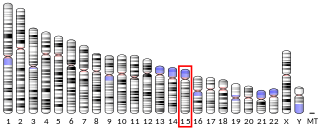
Calcium/calmodulin-dependent protein kinase type II subunit alpha (CAMKIIα), a.k.a.Ca2+/calmodulin-dependent protein kinase II alpha, is one subunit of CamKII, a protein kinase (i.e., an enzyme which phosphorylates proteins) that in humans is encoded by the CAMK2A gene.

Calcium/calmodulin-dependent protein kinase type II beta chain is an enzyme that in humans is encoded by the CAMK2B gene.

Calcium/calmodulin-dependent protein kinase type IV is an enzyme that in humans is encoded by the CAMK4 gene.

Alpha-actinin-1 is a protein that in humans is encoded by the ACTN1 gene.

Calcium/calmodulin-dependent protein kinase type II gamma chain is an enzyme that in humans is encoded by the CAMK2G gene.

Spectrin alpha chain, erythrocyte is a protein that in humans is encoded by the SPTA1 gene.

Alpha II-spectrin, also known as Spectrin alpha chain, brain is a protein that in humans is encoded by the SPTAN1 gene. Alpha II-spectrin is expressed in a variety of tissues, and is highly expressed in cardiac muscle at Z-disc structures, costameres and at the sarcolemma membrane. Mutations in alpha II-spectrin have been associated with early infantile epileptic encephalopathy-5, and alpha II-spectrin may be a valuable biomarker for Guillain–Barré syndrome and infantile congenital heart disease.

Tropomyosin alpha-3 chain is a protein that in humans is encoded by the TPM3 gene.

Alpha-actinin-4 is a protein that in humans is encoded by the ACTN4 gene.

5'-AMP-activated protein kinase catalytic subunit alpha-1 is an enzyme that in humans is encoded by the PRKAA1 gene.

Spectrin beta chain, brain 1 is a protein that in humans is encoded by the SPTBN1 gene.

Proto-oncogene tyrosine-protein kinase FER is an enzyme that in humans is encoded by the FER gene.

Beta-adducin is a protein that in humans is encoded by the ADD2 gene.

Calcium/calmodulin-dependent protein kinase type II delta chain is an enzyme that in humans is encoded by the CAMK2D gene.

F-actin-capping protein subunit alpha-1 is a protein that in humans is encoded by the CAPZA1 gene.

Beta-parvin is a protein that in humans is encoded by the PARVB gene.

Calcium/calmodulin-dependent protein kinase kinase 1 is an enzyme that in humans is encoded by the CAMKK1 gene.

Gamma-adducin is a protein that in humans is encoded by the ADD3 gene.

Spectrin, beta, non-erythrocytic 4, also known as SPTBN4, is a protein that in humans is encoded by the SPTBN4 gene.

Spectrin, beta, non-erythrocytic 5 also known as SPTBN5 is a protein that in humans is encoded by the SPTBN5 gene. SPTBN5 belongs to the spectrin family of cytoskeletal proteins.
























